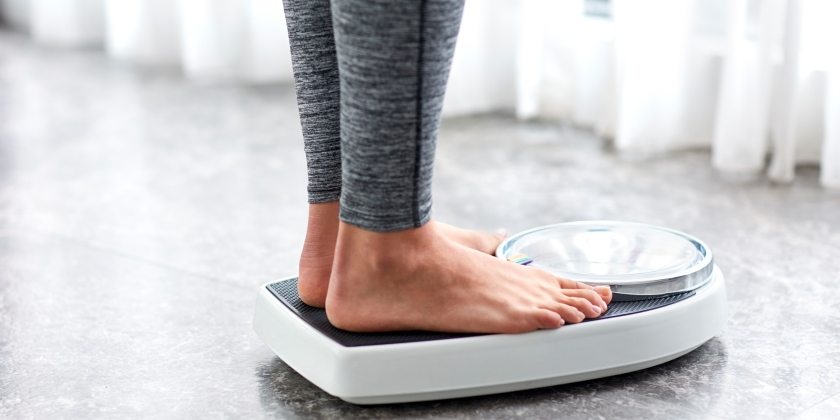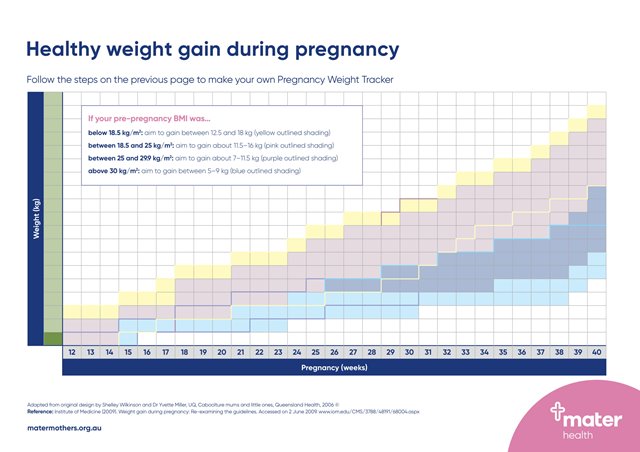Healthy weight in pregnancy
Pregnancy is an amazing time where your body puts on weight to support the healthy growth of your baby. The female body is incredible!

Why is weight important in pregnancy?
Research shows us that it is important to put on enough weight to support the baby’s growth but not too much that it causes health problems for both you and your baby. Monitoring your weight during pregnancy is important for your own health and your baby's health.
Pregnant women who gain weight in accordance with guidelines have the lowest risk of pregnancy and birth-related complications. Women who gain more weight are more likely to have longer hospital stays, caesarean sections, high blood pressure and diabetes in pregnancy. They are also more likely to have trouble losing weight after baby is born and have difficulty breastfeeding. However, women who do not gain enough weight are more likely to deliver their baby early.
Pregnancy is an amazing time where your body puts on weight to support the healthy growth of your baby.
Calculating the right weight gain for you
The pregnancy weight you should aim for depends on what your weight was before you became pregnant. Your dietitian, midwife or obstetrician will calculate this for you and record the weight range on your weight tracker.
What if I am a healthy weight?
As a general guideline, you can expect to gain between 11½ and 16 kilograms during pregnancy. Aim for no more than one to two kilograms weight gain in the first trimester followed by about 400 grams a week after your first trimester.
What if I am underweight?
Women who are underweight before they become pregnant need to put on a little more weight in pregnancy. Aim for an average of half a kilo a week in the last two trimesters.
What if I am above the healthy weight range?
Now is not the time to try to lose weight. Going on a weight loss diet may damage your baby’s development. Aim for no more than 300 grams per week in the second and third trimesters.
More than 50% of women gain MORE weight than is suggested during pregnancy.
How do I work out what is right for me?
Body mass index (BMI) is the number used to work out what is the recommended amount for you. Your BMI may already be documented in your pregnancy record, or you can work it out for yourself (below) or on this website.
My pre-pregnancy weight: __________ kg
My height: __________ m (e.g. 165cm would be 1.65m)
BMI = weight/(height x height) = __________ kg/m²
That is your BMI. Your midwife could help if you are unsure of how to do this.
|
If your pre-pregnancy BMI was:
|
You should gain:
|
|
Less than 18.5 kg/m²
18.5 to 24.9 kg/m²
25 to 29.9 kg/m²
Above 30 kg/m²
|
12½ to 18kg
11½ to 16kg
7 to 11½ kg
5 to 9kg
|
Weight gain goals for women having twins, triplets (or more), or women who are from an Asian background, are slightly different from those above.
What is a healthy way to put on weight?
It is best to gain weight gradually. The way women gain weight varies and is very individual. This is why you are given a range for weight rather than a single number. Most of the weight should be gained in the second and third trimesters when the baby is growing and gaining weight.
How can I monitor my weight gain?
To help you monitor your weight and to have conversations with your obstetrician, midwife or dietitian, you will receive your Mater Mothers' personalised pregnancy weight tracker. The weight tracker is also available from the Mater Mothers' patient portal. There are separate trackers for women having more than one baby or those from an Asian background. These can be provided for you in the antenatal clinic – please ask for one from your midwife, obstetrician or dietitian.

This easy-to-use tool takes the guess-work out of weight gain during pregnancy by allowing you to track your weight gain each week against international and Australian guidelines. Knowing how much weight to gain, having this tailored to your unique situation, and getting continual feedback about how you are progressing, helps you and your healthcare team provide the appropriate care to you during your pregnancy.
The instructions on the back of the Pregnancy Weight Tracker show how to start using the tracker. It is just like the back of a stocking packet—the idea is to stay in the shaded area that’s right for a specific pre-pregnancy BMI range.
Research shows that women who monitor their weight are more likely to gain healthy amounts of pregnancy weight.
Worried about your weight?
Every woman reacts differently to their body changing in pregnancy. Your body is changing to grow a healthy baby. Women come into pregnancy thinking and feeling differently about their body and their body image. If you are uncertain about the changes in your body and how you are coping with them, talk to your dietitian, or obstetrician or midwife (for an appointment to see a dietitian).
If you are worried about your weight changes speak to your doctor, midwife ordietitian.
Pregnancy weight gain—why just setting a number is the wrong conversation
Weight gain in pregnancy—it’s a hotly debated topic. Whether we post about it on our Mater Mothers’ Facebook page or discuss it with our antenatal clinic staff, we get some strong opinions and concerns.
How do I monitor my weight changes?
-
Jump on the scales every one to two weeks at home or the clinic.
-
Use the Mater Personalised Pregnancy Weight Tracker to check your progress. Look at your weight tracker every few weeks. Compare your crosses to the shading and discuss with your dietitian, midwife or obstetrician.
-
If you are part of the txt4two program we will text you once a month and ask you to send your weight to us. Please note that we won’t be commenting on your weight, just using the number for research purposes.
What if I am not gaining enough weight?
Are your crosses below the shading? You may not be gaining enough weight.
It is important to have three meals a day, and also have in between meal snacks such as morning tea, afternoon tea and supper.
Good snacks include:
-
fruit toast
-
dried fruit, nuts and seeds
-
yoghurt
-
muesli bars
-
cheese and crackers
-
milk drinks (i.e. milo and milk, milkshakes).
What if I am gaining too much weight?
Are your crosses above the shading? You may be gaining weight too quickly. To control your weight gain, assess what your pregnancy nutrition needs are with what you are eating.
What are your portion sizes? Are you eating large portions of healthy food? Swap soft drinks, cordial and juice with water.
Make sure you aren’t “eating for two” and include regular exercise most days.
Tips to manage your weight during pregnancy
-
Choose fruit as a snack over biscuits, cakes, chips, chocolate and lollies
-
Chose low fat milk, yoghurt, and cheese in place of full fat products
-
Trim all the fat off your meat before cooking and remove the skin from chicken
-
Limit high fat takeaway foods (or opt for salad varieties)
-
Drink water (not soft drink or cordial) and limit fruit juice to one serve per day
-
Limit eating of desserts and puddings
-
Cut back snacking
-
Increase physical activity or exercise.